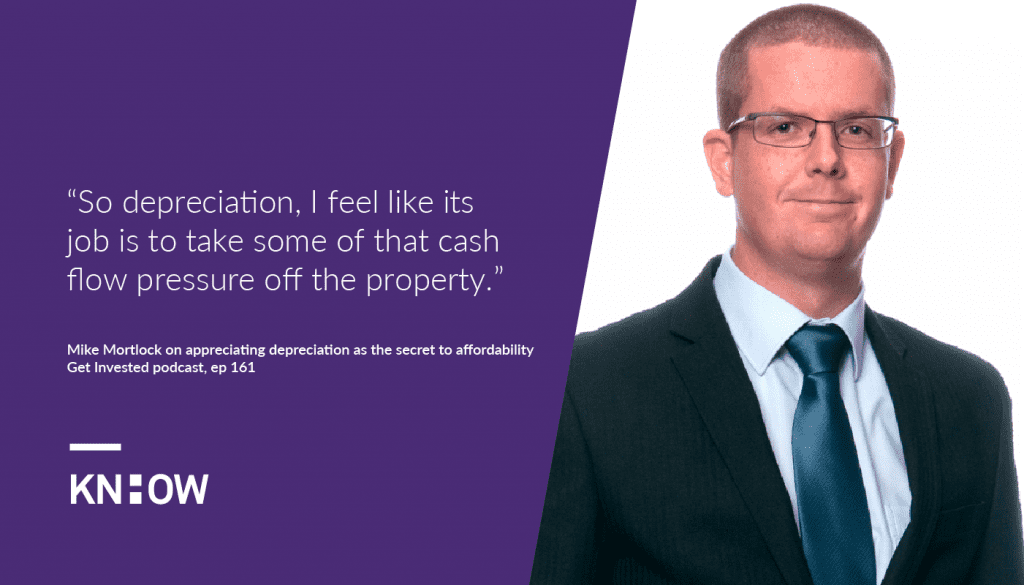Tax depreciation on residential and commercial properties can have a major influence on an investor’s cashflow, says Mike Mortlock.
The leading authority on tax depreciation and managing director of MCG Quantity Surveyors, Mike told KnowHow founder Bushy Martin on the Get Invested podcast about the impact depreciation can have on allowing investors to play the long-term property game without suffering losses in the beginning.
“The hardest time to hold an investment property is right at the beginning,” Mike said.
“And that’s where having those plant and equipment deductions are great because you’re bringing a lot of the deductions to the front of that property. And it’s hard to hold at the beginning because hopefully your rent goes up over time, if you’re paying down your principal then your repayments are reduced, you might build equity over time.
“So depreciation, I feel like its job is to take some of that cash flow pressure off the property. Pre and post depreciation, we could be talking about a negatively geared or a positively geared property. And one of the worst things that I think investors can do is be forced into a position where they need to sell because the ongoing costs are such that they can’t hold onto that property. That’s a disastrous situation to be in.”
Mike said ‘new’ property is typically the best way to go from a depreciation perspective, which is largely thanks to changes brought about four years ago.
“New property is better for depreciation because of the changes that came on the 29th May 2017, where you can only claim the plant and equipment deductions if you’re either buying a brand new property or you’re putting in the new asset in an old property. So certainly the incentives are there to purchase new property,” he said.
Despite this, ‘new’ isn’t always the best choice. Mike said selecting the best property to buy for depreciation deductions isn’t black and white, and it’s important that property investors consider the bigger picture.
“A lot of people will talk to me and they’ll say ‘alright, what’s the best property to buy for depreciation deductions?’ And then I go on to describe the worst investment that you could think of,” Mike said.
“It’s probably one of the apartments where landlords are losing over $11M a month collectively due to vacancies. So these big apartment complexes with eight pools and 12 levels of basement and a cinema and 14 gyms, this is where the best deductions are because you earn a percentage of all of those common areas. But these are normally the worst investments.
“There’s the brand new apartments in Melbourne and Brisbane and certain parts of Sydney that people would have bought and really, really suffered in the last little while. But, a new property in a smaller complex or in a tightly held area that’s got some good fundamentals and some good local employment opportunities is fantastic.
“But I’m careful because if you take, say, a brand new project home built for $300K, you might say that will have great deductions, and it will. But if there’s a property built in the 1930s bought for $2 million, in say one of the inner suburbs of Melbourne, that’s had a $1.5M renovation, then it’s going to blow the deductions out of the water from the new one. So you’ve got to dig a little bit deeper.”
Because of this, Mike encouraged investors to secure a depreciation schedule, which is a report outlining the available tax depreciation deductions.
“So I came up with three triggers telling you when you need a depreciation schedule. The first one is you buy a brand new property. The second one is you build a property that commenced construction after the 16th of September 1987, because that means the original bones will qualify for deductions even if the planning equipment doesn’t,” he said.
“And then the other one is it doesn’t match one or two – it’s not brand new, it’s not built after ’87, but it’s been renovated and the magical number is about $40 – $50K, because if there’s $40K worth of renovations that you did last year on a property that I bought today, then arguably you’re going to get the 2.5% deduction each year. So it’s a $1000 worth of deductions each year. So that’s about the break even point where a depreciation schedule is going to be worthwhile on that property if you’re renting it out for a couple of years.”
Finally, despite the many positives to tax depreciations, Mike warned property buyers to not use it as an investing strategy.
“Depreciation is not an investing strategy, it’s just a bonus. So when people say, ‘what should I buy for the best deductions?’ I like to shock them because they’re on the wrong path,” he said.
“It’s like the people that go into their accountant and say, ‘I want to buy an investment property’. And they say, ‘that’s great, why?’ ‘Because I’m paying too much tax’. And you kind of think like the next question is ‘do you even care about capital growth or the yield or how much it’s going to cost you?'”
Listen to the full interview here.
Want to Know How you can build wealth with property investment? Talk to the team at KnowHow, now.




